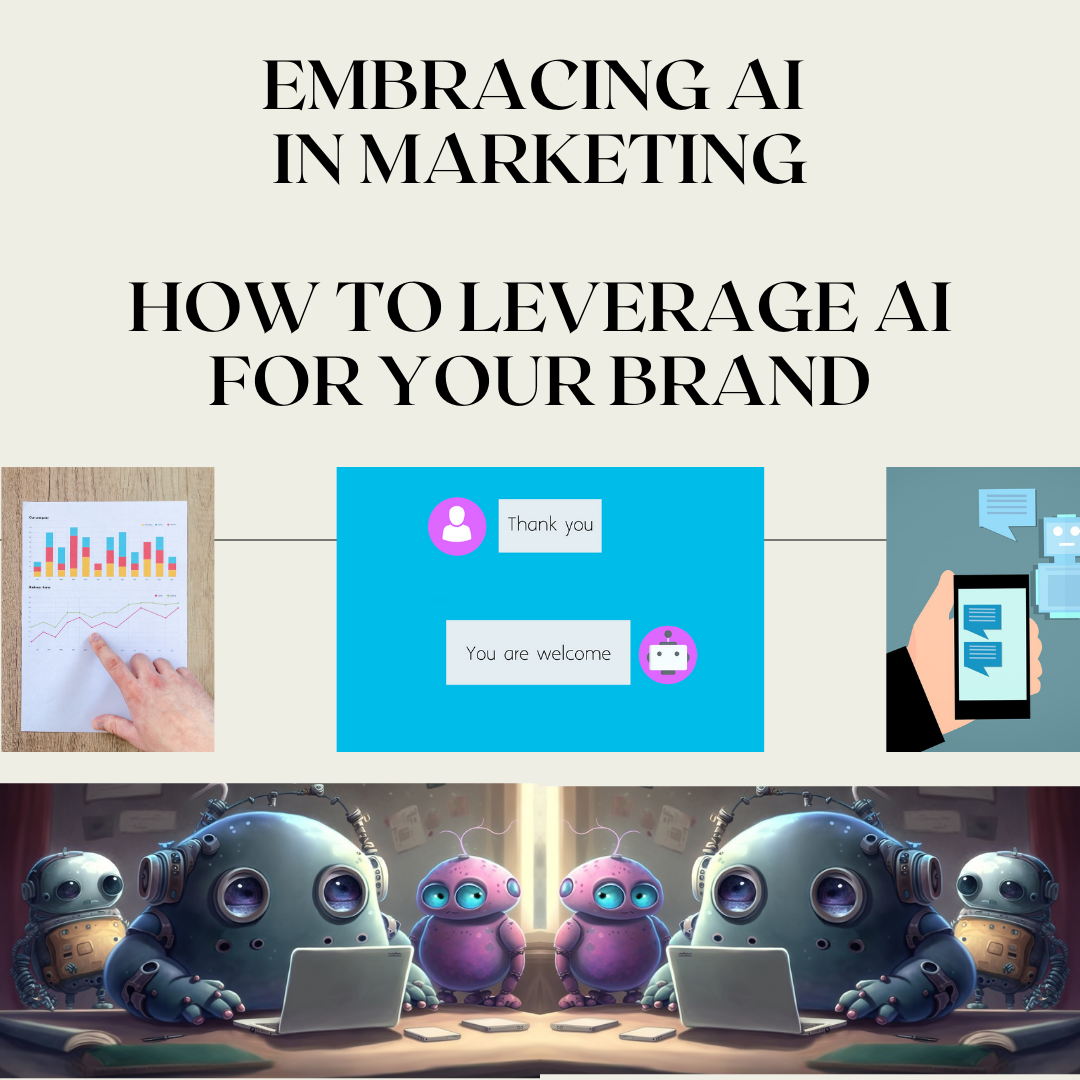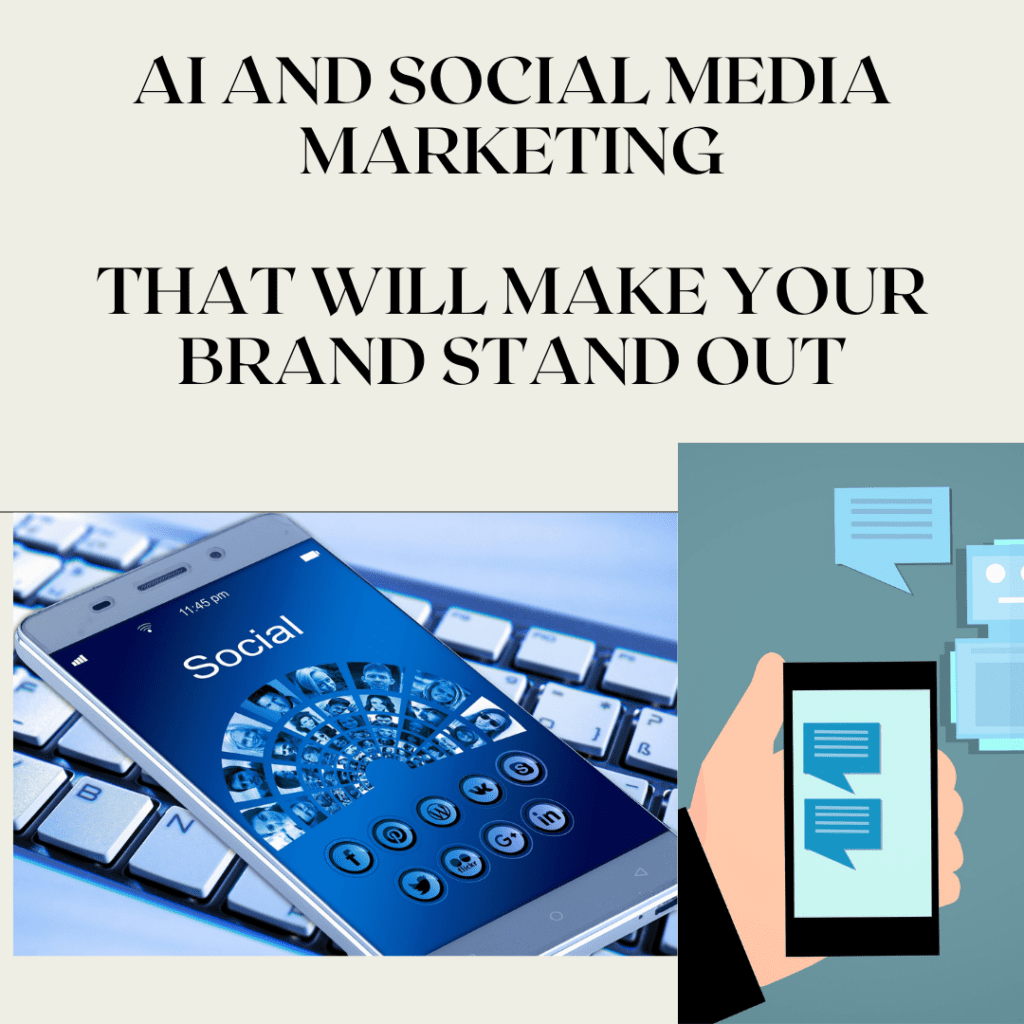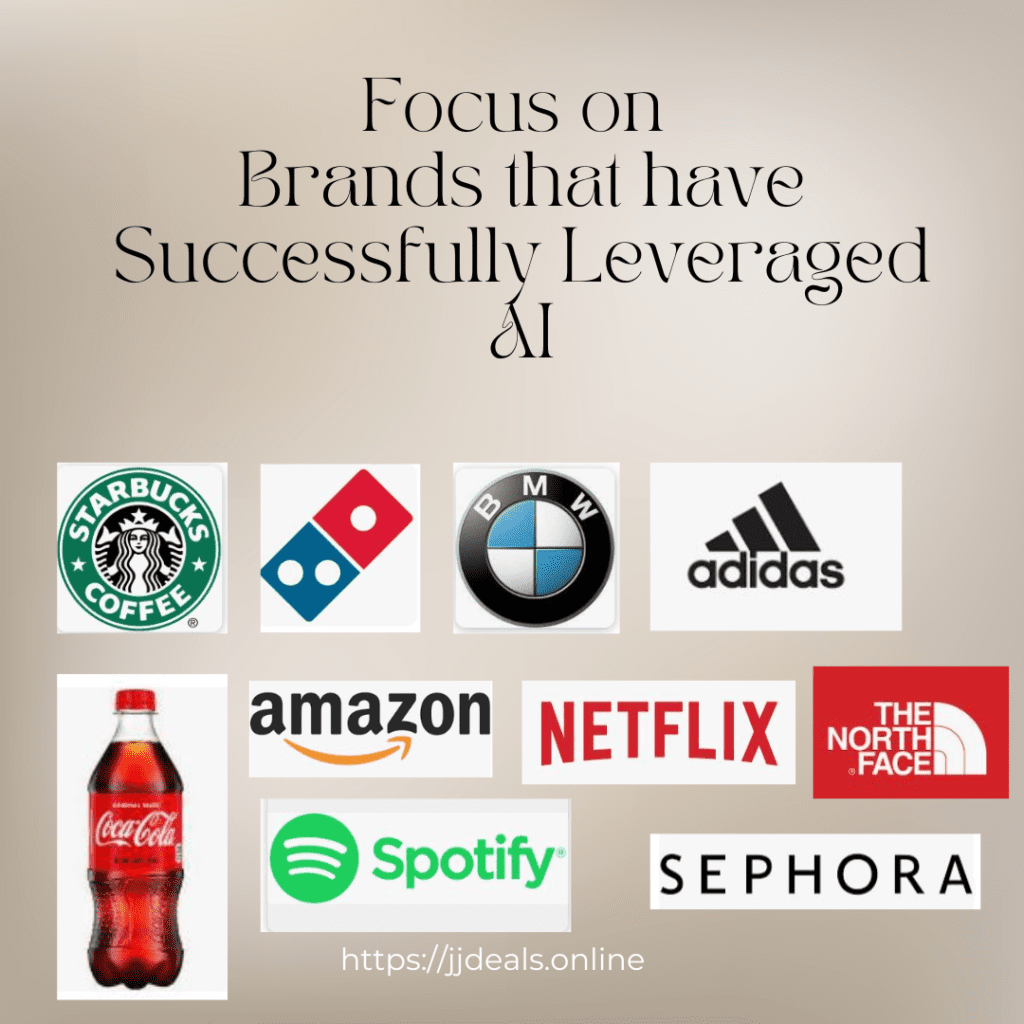
AI in Marketing
Embracing AI in Marketing: How to Leverage AI
Embracing AI in Marketing
Introduction to AI in Marketing
Artificial intelligence (AI) is revolutionizing the way that companies approach marketing. By automating processes, analyzing data, and providing insights, AI is transforming marketing into a more personalized, efficient, and effective practice. Here’s a detailed overview of how AI is transforming the marketing industry:
- Improved Customer Insights: One of the most significant ways that AI is transforming marketing is through improved customer insights. By analyzing large amounts of data, including customer behavior, demographics, and preferences, AI can provide valuable insights into consumer behavior. This helps marketers understand what motivates their customers, what they’re looking for, and how they can tailor their marketing messages to meet those needs.
- Personalized Content: Personalization is a critical aspect of modern marketing, and AI is making it easier for brands to create personalized content. By analyzing data about customers, AI can suggest personalized product recommendations, create targeted ads, and even personalize website content for each visitor. This level of personalization can lead to higher engagement, conversions, and customer loyalty.
- Improved Efficiency: AI can automate time-consuming tasks such as data analysis, ad placement, and content creation. This automation allows marketers to focus on higher-level tasks, such as strategy development and creative thinking. AI-powered automation also ensures that marketing campaigns are delivered consistently and accurately, reducing errors and increasing efficiency.
- Predictive Analytics: AI can be used to analyze vast amounts of data to identify patterns and make predictions about future trends. By leveraging predictive analytics, marketers can forecast future consumer behavior and optimize marketing campaigns to take advantage of these trends. This helps brands stay ahead of the curve and stay competitive in an ever-changing market.
- Chatbots and Virtual Assistants: AI-powered chatbots and virtual assistants are transforming the customer service industry. By providing instant responses to customer inquiries, chatbots can enhance the customer experience and increase customer satisfaction. Virtual assistants can also help customers find products, make purchases, and even schedule appointments, improving the overall customer experience.
- Content Creation and Optimization: AI-powered content creation and optimization tools can help brands create high-quality content that resonates with their target audience. AI can analyze data to determine which types of content perform best with specific audiences, and can even generate content automatically based on customer behavior and preferences.
- Social Media Marketing: AI is transforming the way that brands approach social media marketing. AI-powered tools can analyze social media data to identify trends, track brand sentiment, and identify influential users. This helps brands create more targeted social media campaigns that resonate with their audience and lead to higher engagement.
In conclusion, AI is transforming the marketing industry by improving customer insights, personalizing content, improving efficiency, providing predictive analytics, automating tasks, enhancing the customer experience, optimizing content creation, and transforming social media marketing. As AI continues to evolve and become more accessible, it’s likely that we’ll see even more transformation in the marketing industry in the years to come

Embracing AI in Marketing – Understanding Customer Behavior with AI
One of the most significant advantages of AI in marketing is the ability to gain a better understanding of customer behavior. AI can help businesses analyze vast amounts of data to identify patterns and make predictions about customer behavior, preferences, and purchase patterns. This can be extremely valuable in creating effective marketing campaigns that resonate with customers and drive conversions.
Here are some ways that AI can help businesses understand customer behavior:
- Data Analysis: AI can analyze vast amounts of data, including customer behavior on social media, website activity, and purchase history, to identify patterns and trends. By analyzing this data, businesses can gain insights into what motivates their customers, what they’re looking for, and how they make purchasing decisions. This information can be used to create targeted and effective marketing campaigns that resonate with customers and drive conversions.
- Customer Segmentation: AI can help businesses segment their customers based on demographics, behavior, and preferences. By understanding these segments, businesses can create personalized marketing campaigns that resonate with each group. This can lead to increased engagement and conversions, as customers feel like they are being understood and catered to.
- Predictive Analytics: AI can use predictive analytics to make predictions about future customer behavior based on past data. This can be extremely valuable in creating effective marketing campaigns that take advantage of upcoming trends and customer behavior. Predictive analytics can also help businesses make informed decisions about product development and sales forecasting.
- Personalization: AI can help businesses personalize their marketing campaigns based on customer behavior and preferences. By understanding what motivates their customers, businesses can create personalized marketing campaigns that resonate with each individual. This can lead to increased engagement and conversions, as customers feel like they are being understood and catered to.
- Real-Time Insights: AI can provide businesses with real-time insights into customer behavior, allowing them to adjust their marketing campaigns on the fly. This can be extremely valuable in responding to changes in customer behavior and staying ahead of the competition.
In conclusion, understanding customer behavior is essential to creating effective marketing campaigns that drive engagement and conversions. By leveraging AI-powered tools and techniques, businesses can gain a better understanding of customer behavior, preferences, and purchase patterns. This can lead to more targeted and effective marketing campaigns, personalized content, and a better overall customer experience. As AI continues to evolve and become more accessible, it’s likely that its role in understanding customer behavior will become even more significant, leading to further transformation in the marketing industry.
Predictive Analytics with AI
The use of AI in predictive analytics to forecast future trends, identify potential opportunities and optimize marketing campaigns
Predictive analytics is the use of data, statistical algorithms, and machine learning techniques to identify the likelihood of future outcomes based on historical data. By leveraging artificial intelligence (AI), businesses can improve the accuracy of predictive analytics, enabling them to forecast future trends, identify potential opportunities, and optimize marketing campaigns. Here are some of the ways that AI can be used in predictive analytics
Read more at Predictive Analytics with AI: How to Make Accurate Predictions
Chatbots and Virtual Assistants
The benefits of using chatbots and virtual assistants to provide personalized customer support and enhance the customer experience
Chatbots and virtual assistants are AI-powered tools that can provide personalized customer support and enhance the customer experience. Here are some of the benefits of using chatbots and virtual assistants in marketing:
- 24/7 Customer Support
- Personalization
- Efficiency
- Cost-Effective
- Increased Engagement
- Data Collection
The use of chatbots and virtual assistants can provide a range of benefits for businesses looking to enhance the customer experience. By providing personalized customer support, improving efficiency, reducing costs, collecting valuable data, and increasing engagement, chatbots and virtual assistants can help businesses stay ahead of the competition and deliver a superior customer experience. As AI continues to evolve and become more accessible, the role of chatbots and virtual assistants in marketing is likely to become even more significant, leading to further transformation in the marketing industry.
Read more in detail at Chatbots and Virtual Assistants will make you more efficient

Content Creation and Optimization with AI
How AI can assist with content creation, curation, and optimization to ensure that brands are delivering the right message to the right audience at the right time
Content creation and optimization are crucial components of modern marketing strategies. With the increasing amount of content available online, it can be challenging for businesses to create and distribute content that resonates with their target audience. Fortunately, AI can assist with content creation, curation, and optimization to ensure that brands are delivering the right message to the right audience at the right time. Here are some of the ways in which AI is transforming content creation and optimization:
- Content Generation
- Content Curation
- Personalization
- Optimization
- Performance Analysis
Read more on each of these topics at Content Creation with AI & Optimization: How to Do it?
AI is transforming content creation and optimization by automating many of the time-consuming tasks involved in content creation, curating relevant content, personalizing content, optimizing it for search engines and social media platforms, and analyzing its performance. By leveraging AI-powered tools, businesses can create and distribute high-quality, engaging content that resonates with their target audience, improves brand awareness, and drives conversions. As AI technology continues to evolve, we can expect to see even more advancements in content creation and optimization, leading to further transformation in the marketing industry.
AI and Social Media Marketing
AI is transforming social media marketing, making it more efficient and effective. Sentiment analysis, social listening, and influencer marketing are just a few examples of how AI is being used to help businesses engage with their customers and build their brands on social media. As AI technology continues to evolve, we can expect to see even more innovative applications of AI in social media marketing in the future.
Read more at AI and Social Media Marketing that will make your brand stand out

Ethics and AI in Marketing
The ethical considerations that businesses should be aware of when leveraging AI in marketing, including data privacy, bias, and transparency
Artificial Intelligence (AI) has become an increasingly important tool for businesses in the field of marketing. AI can help businesses analyze large amounts of data, identify patterns and trends, and make predictions about customer behavior. However, the use of AI in marketing also raises a number of ethical concerns. In this article, we will discuss some of the ethical considerations that businesses should be aware of when leveraging AI in marketing, including data privacy, bias, and transparency.
Data Privacy
Data privacy is a critical ethical consideration when using AI in marketing. AI relies on large amounts of data to make predictions about customer behavior, and this data can include sensitive information such as personal preferences, habits, and behaviors. Businesses have a responsibility to protect this data and ensure that it is used only for legitimate purposes.
Businesses should be transparent about what data they collect, how they use it, and who has access to it. They should also provide customers with the ability to opt out of data collection and ensure that any data they do collect is protected with robust security measures.
Bias
Bias is another ethical concern when using AI in marketing. AI algorithms are only as unbiased as the data they are trained on, and if the data is biased, the predictions generated by the AI will also be biased. This can lead to discriminatory or unfair outcomes for certain groups of customers.
Businesses should take steps to ensure that the data they use to train their AI algorithms is representative of the entire population, including underrepresented groups. They should also monitor their AI algorithms for bias and take corrective action if bias is identified.
Transparency
Transparency is another important ethical consideration when using AI in marketing. Customers have a right to know when AI is being used to make decisions that affect them, and they should be provided with clear explanations of how the AI works and how it generates predictions.
Businesses should be transparent about their use of AI in marketing and provide customers with clear information about how their data is being used. They should also provide customers with the ability to access and correct their data, and to opt out of data collection if they choose.
Conclusion
AI has the potential to transform the field of marketing, but businesses must be aware of the ethical considerations involved. Data privacy, bias, and transparency are just a few of the ethical considerations that businesses should keep in mind when leveraging AI in marketing. By taking a proactive approach to these issues, businesses can ensure that their use of AI in marketing is both effective and ethical.
Case Studies – Real-world examples of brands that have successfully leveraged AI in marketing

Here are ten case studies of real-world brands that have successfully leveraged AI in marketing to achieve their business goals:
- Coca-Cola: Coca-Cola partnered with a company called Albert AI to automate its social media advertising.
- Sephora: Sephora uses an AI-powered chatbot called Sephora Virtual Artist to help customers find and try on makeup products.
- Spotify: Spotify uses AI to create personalized playlists for each user based on their listening history and preferences.
- Domino’s Pizza: Domino’s Pizza uses AI-powered chatbots to take customer orders and provide real-time updates on the status of their order.
- BMW: BMW uses AI-powered predictive analytics to identify which customers are most likely to buy a new car.
- Amazon: Amazon uses AI-powered product recommendations to help customers find products they may be interested in purchasing.
- Adidas: Adidas uses AI to create personalized training plans for athletes.
- Netflix: Netflix uses AI to recommend personalized movie and TV show suggestions to each user. The recommendations are based on the user’s viewing history and behavior, and have led to a 75% increase in user engagement with the platform.
- Starbucks: Starbucks uses AI to create personalized offers and promotions for each customer.
- The North Face: The North Face uses AI to help customers find the perfect jacket for their needs.
Visit Focus on Brands that have Successfully Leveraged AI for the complete case study.
These real-world examples show the diverse ways in which businesses can leverage AI in marketing to achieve their goals. From personalized product recommendations to creating personalized training plans, AI is a powerful tool for businesses looking to improve their marketing efforts and deliver a better customer experience
Embracing AI in Marketing –Future of AI in Marketing
The potential of AI to continue transforming the marketing industry and what businesses should do to stay ahead of the curve
Artificial Intelligence (AI) has already made a significant impact on the marketing industry, and its potential for future innovation is immense. AI has enabled businesses to gather and analyze vast amounts of customer data, personalize marketing strategies, and automate various marketing tasks. As technology continues to evolve, AI is poised to transform the marketing industry even further.
One of the most significant potential applications of AI in marketing is the ability to personalize customer experiences. AI algorithms can analyze customer data to create highly tailored and personalized experiences that resonate with each individual. This could include customized product recommendations, personalized content, and targeted messaging that speaks directly to the customer’s needs and preferences.
Another potential application of AI in marketing is in the area of customer service. AI-powered chatbots and virtual assistants can provide 24/7 customer support, answer common questions, and provide personalized assistance to customers. This can help businesses provide a better customer experience, improve customer satisfaction, and reduce customer churn.
AI can also help businesses optimize their marketing strategies by analyzing vast amounts of data in real time. This can help businesses identify trends, predict consumer behavior, and adjust their marketing strategies accordingly. AI-powered marketing automation can also help businesses streamline their marketing efforts, freeing up resources to focus on more strategic initiatives.
To stay ahead of the curve, businesses must embrace AI and integrate it into their marketing strategies. This means investing in the necessary technology and talent, and ensuring that data is properly collected, analyzed, and secured. Businesses must also be transparent about their use of AI and ensure that they adhere to ethical standards and regulations related to data privacy and bias.
In conclusion, the future of AI in marketing is bright, and businesses that embrace this technology will be better positioned to deliver personalized, engaging experiences that meet the needs and preferences of each individual customer. By investing in AI and taking a proactive approach to staying ahead of the curve, businesses can reap the benefits of this powerful technology and remain competitive in an increasingly digital world.
Habit Hacks: The Art of Building Good Habits and Breaking Bad Ones




